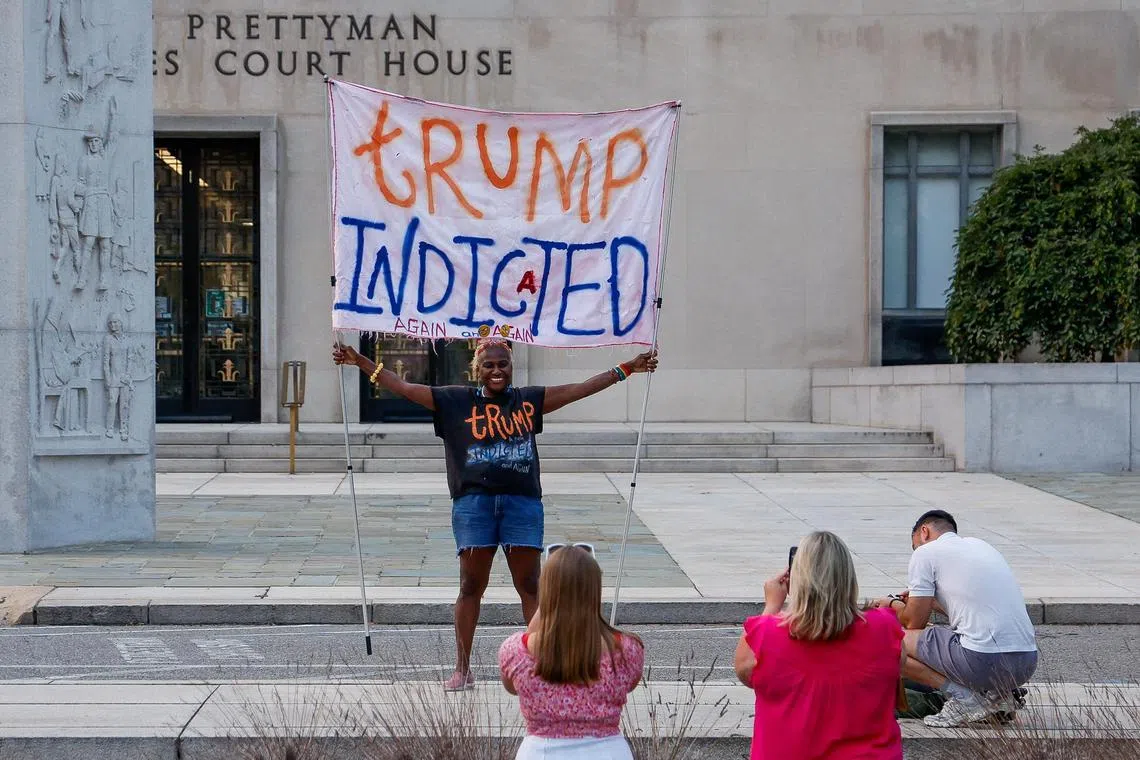What if Trump is elected with criminal charges still looming?
Sign up now: Get ST's newsletters delivered to your inbox

It is not yet clear when a trial over Trump's efforts to overturn the 2020 election will start.
PHOTO: REUTERS
NEW YORK - If former president Donald Trump won the presidency even as criminal charges against him still loomed, a series of extraordinary complications would ensue.
The Tuesday indictment on federal charges stemming from his attempts to remain in power after his 2020 election loss
In New York, he is accused of falsifying business records in connection with a hush money payment while special counsel Jack Smith also previously accused Trump of mishandling national security secrets.
If a federal case were pending on Inauguration Day, Trump could simply use his power as president to force the Justice Department to drop the matter, as he has suggested he might do.
It is not yet clear when a trial over his efforts to overturn the 2020 election will start. The classified documents case, which will be tried in Florida, has a date set for May, but that could change depending on how pretrial arguments unfold.
But the Constitution does not give presidents supervisory authority over state prosecutors, so that would not work for the state inquiries in New York and Georgia, where the Fulton County district attorney Fani Willis has indicated she is nearing a decision on charges in her own election-interference investigation.
The most Trump could probably do is try to delay a trial over any state charges that may be pending. In the past, the Justice Department has taken the position that criminal legal proceedings against a president while he is in office would be unconstitutional because it would interfere with his ability to perform his duties.
There is no definitive Supreme Court ruling on the matter because the issue has never arisen before. In 1997, the Supreme Court allowed a federal lawsuit against then President Bill Clinton to proceed while he was in office – but that was a civil case, not a criminal one.
Trump’s trial in New York on charges of bookkeeping fraud is scheduled to begin in March. The timing of any trial in Georgia is an open question.
If Trump were convicted in one or more cases, he would almost certainly pursue appeals, delaying any sentencing and all but ensuring he is not incarcerated by Inauguration Day. The question would then arise of what would happen if he took office for a second term.
If Trump were convicted in a federal case, he would likely move to pardon himself, a power he claimed in 2018 that he had the “absolute right” to wield. It is not clear whether a self-pardon would be legitimate.
No text in the Constitution bars a president from doing so. But in 1974, the Justice Department issued a terse legal opinion stating that then President Richard Nixon did not appear to have the authority to pardon himself “under the fundamental rule that no one may be a judge in his own case”.
But the opinion did not explain what transformed that principle into an unwritten limit on the power the Constitution bestows on presidents. Legal experts have disagreed on that question, but no president has ever claimed he was pardoning himself, so it has never been tested in court.
In such a scenario, Trump is almost certain to use his control of the Justice Department to ensure that it sides with him on whether a self-pardon is legitimate. If prosecutors do not challenge a self-pardon, it is not clear who else would have legal standing to pursue the matter.
If Trump were convicted in New York or Georgia, he could not pardon himself because the Constitution does not empower a president to forgive state offences. That is instead a power wielded by governors. If the relevant governor did not pardon him, he could seek a federal court order delaying any incarceration – or requiring his release from prison – while he is the sitting president, on constitutional grounds.
Yet another possibility is that if he were incarcerated, he could be removed from office upon the start of his second term, under the 25th Amendment, as “unable to discharge the powers and duties of his office”.
But that outcome would require the majority of a president’s Cabinet, along with the vice-president, to make such a determination. Among the questions that possibility would raise is who would qualify as a Cabinet member if the Senate had not confirmed any new political appointees by Trump. THE NEW YORK TIMES


